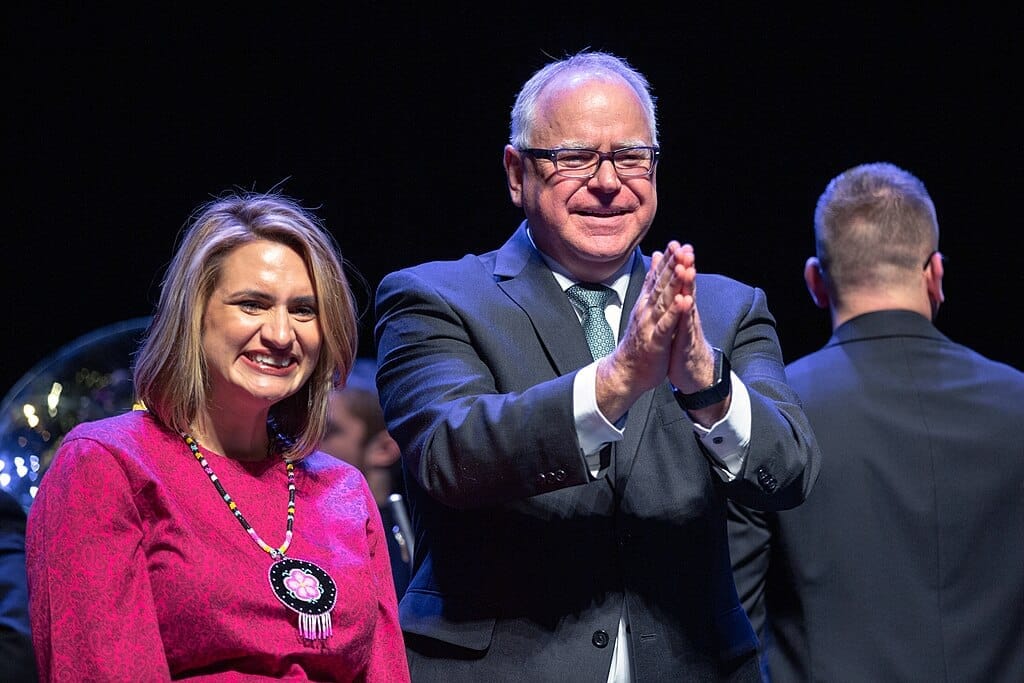Harris Pick Walz Just Signed Law Favorable to Muni Broadband
Walz has been lauded for his commitment to infrastructure development and broadband expansion in Minnesota.
Jericho Casper

WASHINGTON, August 6, 2024 – Minnesota Gov. Tim Walz, selected by Vice President Kamala Harris as her running mate for the upcoming November election, took decisive action in May by signing a law that dismantled barriers to local government ownership of broadband networks in Minnesota.
By signing the bill, Walz ensured that local governments in his state can compete with Comcast and Mediacom for federal broadband grant money supplied by the Broadband Equity, Access, and Deployment (BEAD) Program to connect unserved and underserved households.
Walz’s signature repealed two laws to promote the rollout of government-owned networks. One bill repealed a law that required municipalities to secure a supermajority vote in a local referendum to buy or construct "telephone exchanges." Although originally intended to regulate telephone service, the law had been interpreted to impose the same supermajority requirement for building of municipal broadband networks.
Walz also repealed a state statute that allowed municipalities to improve, construct, extend, and maintain facilities for internet access only if no private provider was offering service in that municipality – a change in law that set up direct competition between government-owned networks and privately backed ISPs.
Gigi Sohn, executive director of the American Association for Public Broadband, praised the Walz selection.
"It's heartening that Gov. Walz understands the value of public broadband and local control, enough so that he signed a law repealing restrictions on community broadband in Minnesota," Sohn said.
A long-time proponent of infrastructure, labor, and broadband initiatives, Walz demonstrated his commitment to broadband accessibility by leading efforts to eliminate the century-old state restrictions, despite objections from private companies citing concerns about unfair competition.
This policy, designed to boost competition and improve connectivity across Minnesota’s rural and urban regions, was a testament to how Walz’s political career closely matches the Democratic party’s agenda of modernizing America’s infrastructure for the digital age, continuing the groundwork laid by President Joe Biden.
As Minnesota Governor, Walz has been instrumental in driving significant infrastructure improvements. He signed into law the largest infrastructure bill in the state’s history, and his tenure has been marked by a strong emphasis on expanding broadband access, particularly in rural areas.
In 2022, Walz announced the largest-ever investment in high-speed internet in Minnesota’s history, nearly $100 million. His 2020 budget also included what he called a “moonshot” for rural broadband, which aimed to bring broadband access to rural areas within two years.
Having grown up in rural Nebraska, Walz was familiar with the challenges of rural life and has openly expressed his deep frustration with the poor broadband access affecting parts of Minnesota.
Before becoming Governor, Walz served a twelve-year tenure in the U.S. House of Representatives, having been elected in 2006 to represent Minnesota's 1st district. During this period, Minnesota emerged as a leader in broadband development.
Under strong leadership from executive and legislative branches, the state established the Office of Broadband Development in 2014, followed by the pioneering Border-to-Border Broadband Grant Program.
“Helping more Minnesotans get online at high-speeds is one of the ways we’re making Minnesota the best state for families, workers, and businesses,” Walz said in March, announcing an additional $50 million in grants to expand broadband access to 8,900 locations.









Member discussion